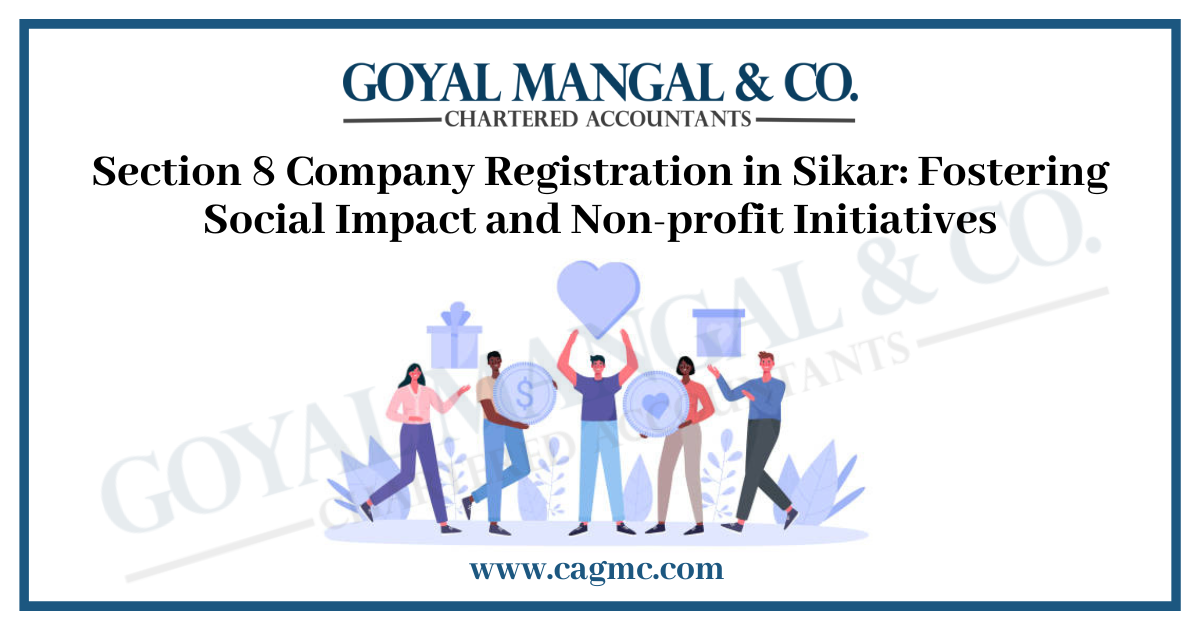
Section 8 Company, as per the provisions of the Companies Act, 2013 in India, is a special kind of organization dedicated to promoting charitable or non-profit activities. Its core purpose is to advancing societal welfare, a Section 8 Company offers a legal structure for individuals and groups to channel their efforts towards causes that benefit communities and address pressing social issues. This article explores into the rules and regulations of Section 8 Company registration in Sikar, delving its objectives, necessary documents, and application procedure.
What do you mean by Section 8 Company Registration?
Section 8 Company Registration refers to the process of incorporating and legally establishing a company under Section 8 of the Companies Act, 2013 in India. A Section 8 Company, also known as a Non-Profit Organization (NPO), is formed with the primary objective of promoting charitable or non-profit activities for the benefit of society.
Unlike other types of companies, a Section 8 Company is prohibited from distributing dividends or profits to its members. Instead, any income generated by the company is utilized solely for advancing its stated objectives and promoting its charitable purposes. This legal structure enables individuals and organizations to create entities dedicated to social welfare, education, healthcare, art, research, and other non-profit endeavours.
By registering as a Section 8 Company, entities gain legal recognition, tax exemptions, and access to various benefits and privileges. These companies can receive donations, grants, and funding from individuals, institutions, and government bodies to support their charitable activities. They are also subject to compliance obligations such as maintaining proper financial records, filing annual returns, and adhering to the regulations set forth by the MCA.
Section 8 Company incorporation provides a structured framework for individuals and organizations to establish entities dedicated to social welfare and non-profit initiatives. It enables them to contribute to the betterment of society, address social issues, and create a positive impact in the communities they serve.
Objectives of Section 8 Company’s registration
The main objective of Section 8 company incorporation in India is to promote charitable or non-profit activities for the benefit of society. These activities can be in various fields such as education, art, science, sports, research, social welfare, religion, and more. The primary focus of a Section 8 company is to engage in activities that have a social or public welfare aspect and contribute to the betterment of the community.
- The main objective of a Section 8 Company should be to promote charitable or non-profit activities. These activities can include the promotion of education, science, art, research, sports, social welfare, religion, or any other similar purpose. The company should intend to apply its profits, if any, solely towards promoting its objectives.
- Non-Distribution of Profits: A Section 8 company is prohibited from distributing dividends or profits to its members. Any income generated by the company should be utilized for furthering its charitable purposes and not for personal gain.
- Prior Approval: Before applying for Section 8 company registration, you need to obtain prior approval from the Central Government or the Regional Director of the Ministry of Corporate Affairs (MCA). This approval is required to ensure that the objectives and activities of the proposed company align with the provisions of Section 8 of the Companies Act, 2013.
Documents for Section 8 Company registration in Sikar
To company register under Section 8 in Sikar, the following documents are typically required:
- Directors’ Documents:
- Identity Proof: Copy of PAN Card (for Indian nationals) or Passport (for foreign nationals) of all the proposed directors.
- Address Proof: Copy of Aadhaar Card, Passport, Driving License, or Voter ID Card of all the proposed directors.
- Passport-sized Photographs: Recent passport-sized photographs of all the proposed directors.
- Subscribers’ Documents:
- Identity Proof: Copy of PAN Card (for Indian nationals) or Passport (for foreign nationals) of all the proposed subscribers/members.
- Address Proof: Copy of Aadhaar Card, Passport, Driving License, or Voter ID Card of all the proposed subscribers/members.
- Passport-sized Photographs: Recent passport-sized photographs of all the proposed subscribers/members.
- Registered Office Documents:
- Proof of Registered Office Address: Copy of the electricity bill, water bill, property tax receipt, or lease/rent agreement along with a No Objection Certificate (NOC) from the owner of the premises.
- Utility Bill: Copy of the latest electricity bill, water bill, or property tax receipt for the registered office address.
- Memorandum of Association (MOA): Drafted MOA specifying the name, objectives, and rules governing the activities of the Section 8 company.
- Articles of Association (AOA): Drafted AOA outlining the regulations and internal governance structure of the Section 8 company.
- Declaration: Declaration by the proposed directors and subscribers stating their intention to form a Section 8 company.
- Approval from the Central Government: Prior approval obtained from the Central Government or the Regional Director of the MCA, as required under Section 8 of the Companies Act, 2013.
Application process for Section 8 Company Registration in Sikar
For Section 8 company registration online in Sikar, you need to follow the application process outlined below:
- Obtain Digital Signature Certificate (DSC): To obtain DSC for all proposed directors and subscribers. DSC is an electronic form of signature that is required for online filing of documents with the MCA.
- Obtain Director Identification Number (DIN): Each proposed director needs to obtain a DIN from the MCA. DIN is a unique identification number assigned to individuals who wish to become directors of a company.
- Name Reservation: Choose a unique name for your Section 8 company and apply for name reservation through the RUN (Reserve Unique Name) facility on the MCA portal. Make sure the chosen name complies with the naming guidelines provided by the MCA.
- Drafting of Memorandum of Association (MOA) and Articles of Association (AOA): Prepare the MOA and AOA of the company. These documents define the objectives, rules, and regulations of the Section 8 company.
- Incorporation Application: File the incorporation application with the Registrar of Companies (RoC) through the SPICe+ (Simplified Proforma for Incorporating Company Electronically) form on the MCA portal. The SPICe+ form combines various applications, including DIN allotment, name reservation, and incorporation, into a single form.
- Documents Submission: Upload the necessary documents along with the incorporation application. The documents may include the MOA, AOA, declaration by directors/subscribers, proof of registered office address, and other supporting documents as required.
- Payment of Fees: Pay the prescribed fees for incorporation and other applicable fees online through the MCA portal. The fee structure may vary based on the authorized capital and other factors.
- Verification and Approval: The RoC will verify the submitted documents and process the application. If all the requirements are met and the documents are in order, the RoC will issue a Certificate of Incorporation.
- Post-Incorporation Compliance: After obtaining the Certificate of Incorporation, you need to complete post-incorporation compliance requirements such as obtaining a Permanent Account Number (PAN) and Tax Deduction and Collection Account Number (TAN), opening a bank account, and registering for GST if applicable.
Rules and Regulations under Section 8 Company Registration in Sikar
Rules and regulations provide the framework for the functioning and operations of Section 8 companies. Here are some key rules and regulations that apply to Section 8 company registration:
- Charitable or Non-Profit Objectives: The primary rule is that the main objective of a Section 8 company should be to promote charitable or non-profit activities. The company must have a clear purpose that benefits the society or a particular section of it.
- Non-Distribution of Profits: Section 8 companies are prohibited from distributing dividends or profits to its members. Any income generated by the company should be utilized solely for promoting its objectives and furthering its charitable activities.
- Licensing and Approval: Prior approval is required from the Central Government or the Regional Director of the MCA before incorporating a Section 8 company. This approval ensures that the proposed company’s objectives align with the provisions of Section 8 and that it qualifies for the benefits and exemptions available to such companies.
- Use of Income: The income generated by a Section 8 company should be used solely for promoting its charitable objectives. The company cannot utilize the income for personal gain or any other purposes not aligned with its stated objectives.
- Limited Liability: Section 8 companies enjoy the benefit of limited liability, which means that the personal assets of the members or directors are generally protected from the company’s debts or obligations. However, there are certain exceptions to this rule, such as cases of fraud or improper conduct.
- Board of Directors: Section 8 companies are required to have a minimum of two directors. The directors are responsible for the management and administration of the company and ensuring compliance with the applicable laws and regulations.
- Audit and Compliance: Section 8 companies are required to maintain proper books of accounts and prepare financial statements in accordance with the applicable accounting standards. The financial statements should be audited by a qualified auditor and submitted to the regulatory authorities.
- Statutory Filings: Section 8 companies must comply with various statutory filings, such as filing annual returns, financial statements, and other necessary documents, with the RoC. These filings provide transparency and ensure compliance with the regulations.
- Regulatory Bodies: Section 8 companies may be subject to regulation and oversight by specific regulatory bodies depending on their activities. For example, if engaged in fundraising from the public, they may need to comply with the provisions of the Companies (Acceptance of Deposits) Rules, 2014.
Takeaway
Section 8 Company Registration is not just a legal process; it is an opportunity to make a lasting difference. Section 8 Company Registration provides a unique platform for individuals and organizations to make a significant social impact by channelling their efforts towards charitable and non-profit activities. By adhering to the provisions of the Companies Act, 2013, these entities can create sustainable initiatives, address social issues, and contribute to the betterment of society. By leveraging the provisions and benefits offered by this unique entity, individuals and organizations can bring about positive change, leaving a profound impact on society and shaping a better future for generations to come.







